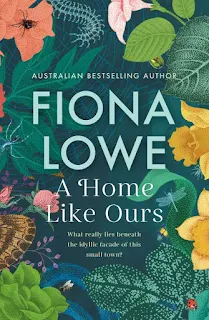Intro
I love it when a book surprises you, and that was the case when guest reviewer Neil Béchervaise offered to read and review A Home Like Ours by Australian author Fiona Lowe. He wasn't expecting a five star reading experience but books can do that, they can surprise us in so many wonderful ways. Enjoy Neil's review below.Neil's Review
Homeless women and domestic violence, council corruption and apparently caring community members in conflict with each other, Fiona Lowe’s latest novel has it all, in spades.I have to confess, I began reading this book with some trepidation. Recent experience suggested that I would probably, once again, be confronted by too many ill-developed characters trampling confusedly through 500 odd pages of poorly developed plot with a plethora of description to fill out the space. I decided to read the first 20 pages and the Acknowledgements (often a clue to how the novel was realised, and by whom).
In fact, I was engaged from the first paragraph, a woman sleeping rough in her car; too cold, too cramped and too poor to use up petrol running the car for its heating. Forced to move on in panic when suddenly surrounded by a hooligan mob, she drives to a country town coffee shop and, for a few hours at least, she finds some peace. And that’s just the Prologue.
But then it comes. Just as I thought. Chapter 1 finds a woman power-dressing to wow her husband. (It doesn’t work). And now we are in Boolanga, a country town on the Murray River – somewhere near Cobram, Numurkah and ‘Wang’. We get the picture but we are spared the details because the plot is moving on. Great relief.
New characters will be introduced in the coming chapters. New scenarios will be sketched out in sufficient detail for us to empathise with the inhabitants, the victims perhaps.
“Here we go”, I might have said. "A multitude of characters and …”. But these people were, somehow, more real. Tara, with her two young children was having trouble arousing her husband – was he having an affair? And how did she really feel about Zac, her personal trainer? Nineteen year old Jade with her baby was suffering emotional abuse from the baby’s father. He was occasionally present, usually drunk and completely unsupportive. Helen, the homeless woman, had found shelter in a disused heritage house in exchange for managing the town’s community garden. She was out of the car. She had a foot on the ground in Boolanga. But it was still uncertain.
The introduction of a refugee community on the edge of town provides that level of tension that we like to deny. The reality of the racism affects each of the women in different ways and, together with the management and development of the garden, generates serious conflict between former ‘besties’. More importantly, it opens the way for a series of plot developments that are both heart-wrenching, joyous, and all too familiar.
Fiona Lowe’s fifth novel A Home Like Ours might make a movie but it is more useful in challenging us to review our personal values, attitudes and approaches to the central issues of homelessness, domestic violence and racism. Is every robbery really committed by gangs of African youths? Every drug deal? Hey, didn’t we used to blame those on gangs of Vietnamese youths? And. And…
A Home Like Ours is a well crafted novel, a genuine page-turner, a compelling read for anyone who is willing to take the risk of changing how they believe ‘the other half’ actually live.





































I enjoyed this a lot too, thanks for sharing your thoughts
ReplyDeleteThanks Shelleyrae, I've seen lots of great reviews for this.
Delete